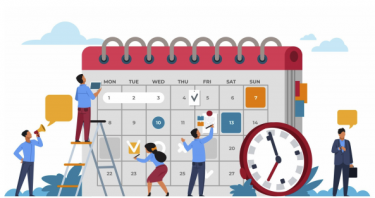 If you’re able to organize your life without a calendar, I have two things to say: 1) You are a miracle; and 2) The following does not apply to you.
If you’re able to organize your life without a calendar, I have two things to say: 1) You are a miracle; and 2) The following does not apply to you.
For everyone else, I have some proven advice that will help you get the most from your daily, weekly, monthly, and even annual schedule, while helping you free up precious time and prioritize things that are more important to you.
In no particular order, they are as follows:
Continue reading…

Courtesy Shutterstock
Do you know what happens when world-class athletes stop taking time-outs? Their body slows down and they start making bad decisions. Anyone who’s every played competitive sports or even performance art already understands this truth.
And yet when it comes to office work, many of us overlook the importance of regular breaks. We mistakenly assume that just because we’re not exerting our bodies, we don’t need rest. But breaking isn’t just for people who tax their bodies for work, it’s for anyone who thinks and makes lots of decisions—you very much included.
To that end, here are 5 ways regular breaks can help you work smarter, faster, and even longer: Continue reading…

Credit: Wikimedia Commons
There are a lot of productivity myths. For instance, early birds are more productive, structure kills creativity, adding resources increases output, and more. Although well intentioned, these are all wrong.
So what works? What productivity hypotheses have been tested and proven by science? After sifting through dozens of top search results, reports, and studies, this is what I found. The most convincing, substantiated, and established productivity strategies: Continue reading…

Dell
My millennial brother-in-law chided me recently for using only a single monitor. “Get with the times,” he joked. “Two screens will boost your productivity.”
I’m normally confident about my technology use, but his remark surprised me since no one had questioned the size of my desktop display before. Keep in mind, I’ve worked from home for over a decade, so I don’t get to see how the Jones’ use computers at work. I don’t see their workspaces—only their faces over Skype calls or in conference rooms or voices over phones or words over email.
Self consciously, I began asking family and friends if they used dual monitors at work. “All the time,” said one. “Have for years,” said another. “Will never go back!” exclaimed a third. With exception to one, all my inquires said “yes.” Even my dad and father-in-law use dual screens at work. BABY BOOMERS MORE WIRED THAN ME??!! Continue reading…
I teach Sunday School once a month to a small group of boys. Last week, I taught a subject that is dear to my heart: using time wisely. Spiritual advice aside, the lesson also included some excellent secular counsel, in the form of the following short story: Continue reading…

I’ve always thought these two looked eerily similar, and now I have proof. Ferriss is clearly a strawberry blonde Steve-O. And with that, I have finally become a niche celebrity blogger. It only took me three years.
See also: Book review: The 4-Hour Work Week
Seth Mnookin, a freelancer of four years, waxes poetic on the subject of unproductive efficiency in a recent Wired column:
“My campaign to increase productivity had become yet another distraction — and a significant one. Suddenly I needed to time-manage my time management… [so] I forced myself to quit optimizing how I get things done and start actually getting things done.”
Amen to that — and precisely in line with what Timothy Ferriss counsels in The 4-Hour Work Week. Productivity, not efficiency, is paramount. Now if I could only practice what I preach…
You know mulitasking is nothing more than a feel-good concept, right? It’s a word people use to make them feel more productive. And “work-life balance” is anything but according to productivity ninja Tim Ferriss:
“For most of the planet, I would assert that the ideal dream job is the one that takes the least time. Be productive instead of busy, and recognize that life is full of special relationships and activities that need to be protected from one another. Focus on artful separation instead of integration, and you might just—as I did—feel as though an enormous burden has been lifted. Expect a lot out of life, but don’t expect too much from your job. It’s just one tool. Make it a specific one.”
Wise counsel.
See also: Book review: The 4-Hour Work Week
I don’t know where I came up with this, but I’m sure it was from someone smarter than me. When successfully connecting with someone on the phone after first leaving a voicemail and/or email, don’t ask the person if they “got your message.” It does you no good and merely wastes an additional minute or two before getting to the real purpose for the call, to solve a problem.
I’ve started implementing this policy and can say it works wonders. I simply say “Hello,” after the person answers and proceed to ask my original question assuming they didn’t get my message. This speeds things up and gets you your information quicker than the usual. Who cares if they got your message, what matters is that you get your answer.
Fact: I believe 75% of all in-person meetings are unnecessary. That said, an anonymous individual published a comment yesterday on an older post of mine in which I criticized unnecessary meetings. This is what s/he said:
“Routine meetings bring routine results.”
I respectfully disagree, though I appreciate the commenter for challenging my stated beliefs. So in his/her same spirit (or assuming I misunderstood their definition of “meetings”), I give to you Smooth Harold’s oversimplified expressions on what brings routine results. And I quote (myself)…
Routine productivity brings routine results.
Routine accountability brings routine results.
Routine management brings routine results.
Routine practice brings routine results.
Routine humility brings routine results.
Routine planning brings routine results.
Routine work (that meets your goals, not busy work) brings routine results.
Don’t confuse a majority of your meeting time with getting work done (GTD). Skip or rethink most of your meetings in favor of weekly email updates that ask, “What’s been done?” “What will be done?” and “Is there anything stopping you from getting your work done?” Even ask yourself that. Then once a month have a phone call or in-person meeting to follow up with the weekly ones. This concept alone has gotten me “results” over the last four years when dealing with others, meeting deadlines, and increasing productivity so I can focus on relevant tasks that meet my financial objectives.
At the same time, I’m a big believer in the human element. That is meeting often as friends, co-workers, clients, associates, and colleagues. Earmark copious amounts of your time to enjoy one another’s company without exception. Just don’t call it work.
UPDATE: As Jordan so kindly pointed out in the comments, I may have misinterpreted my anonymous commenters quote, that is routine in a negative light. After consulting a dictionary, I’m not sure if I exposed my lack of diction prowess or if routine can be used in a positive way as I did above. Whatever the case, hopefully something can be derived out of what was said above…
Well, this has to be the coolest list of lifehacks, productivity tips, and stress releivers I’ve seen in a long time. Some of my favs: Synchronize recurring events, put all of your home access points on a single key, outsource your chores to the local neighbor kid for $10, avoid traffic, use autopay, let the phone ring, say “no,” and keep lists (or send yourself notes). Get that!
 If you’re able to organize your life without a calendar, I have two things to say: 1) You are a miracle; and 2) The following does not apply to you.
If you’re able to organize your life without a calendar, I have two things to say: 1) You are a miracle; and 2) The following does not apply to you.



